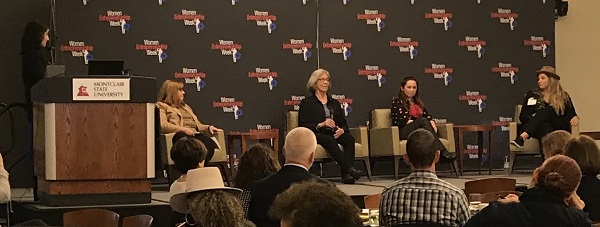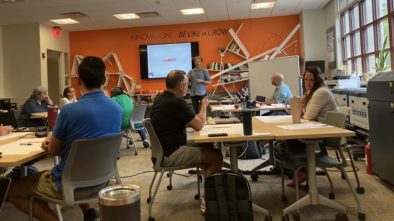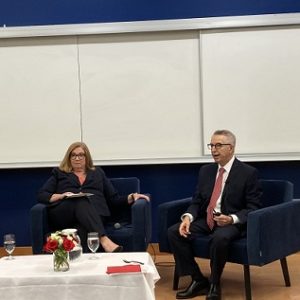Female Tech Entrepreneurs Talk about Challenges at Women Entrepreneurship Week Conference in Montclair
Working around the clock and living in her parents’ home to save money for her company, entrepreneur Jessica Gonzalez thought that dealing with mathematics was aggravating.
Then she hired an engineer on Craig’s List.
“I was 28. I didn’t know much about hiring engineers, but I knew I needed one. And one of the first engineers I hired would hold my products hostage for dinners, where we would sit for hours and chat about life. It was creepy,” she recalled.
Gonzalez, the founder and CEO of InCharged (Newark), a leading custom cell-phone charging and tactical marketing business, talked about the challenges of being a female entrepreneur. She was a participant in a panel discussion that attracted an audience of 300 female tech bosses, workers and others during the Women Entrepreneurship Week 2019 conference, held last month at Montclair State University.
“We have a diverse audience at our Women Entrepreneurship Week conference, ranging from seasoned serial entrepreneurs to those who are just getting started,” said Carley Graham Garcia, executive director of Montclair State’s Feliciano Center for Entrepreneurship & Innovation. “We offer content that is both inspirational and practical, to help go-getters launch and grow a business. Also, the conference offers excellent networking, as the 300 attendees meet and share advice, especially with our Montclair State students who are in the audience.”
All told, more than 200 universities and colleges in 30 countries and 43 states, plus Washington D.C., hosted similar conferences for Women Entrepreneurship Week, which was started by Montclair State.
Discussing Difficult Topics
The panelists discussed difficult topics such as harassment and inappropriate behavior. “I had to dress down at trade shows or get harassed, or [only be] offered business opportunities [if] I’d go out to dinner,” said Gonzalez. “You must have thick skin. And I’m proud to say that predators are a lot more scared these days. So, change is happening.”
The other panelists were Kathleen Coviello, vice president of technology & life sciences investments at the New Jersey Economic Development Authority; Jeanne Pinder, founder and CEO of ClearHealthCosts (Pelham, N.Y.), a digital startup; and Rachel Lyubovitzky, cofounder and CEO of EverythingBenefits (New Providence), a provider of benefits management solutions.
Pinder was quick to say what motivates her.
“I love it when people tell me, ‘You can’t do that.’ It really inspires me. My answer is, ‘Just watch me,’” she said.
She also said that her company is itself inspiring. “It’s changing people’s lives by telling them how to save money on health care, and how to get health care services and prescriptions they thought they could not afford because they are too expensive.”
“I love it when people tell me, ‘You can’t do that.’ It really inspires me. My answer is, ‘Just watch me.’” Jeanne Pinder, founder and CEO of ClearHealthCosts
Pinder, now 65 years old, talked about the challenges she faced at 56 while launching her company, which focuses on revealing the secrets of healthcare pricing.
“We did try for a little while to raise money, but generally in the startup world, I felt people looking at me, asking, ‘Where’s your CTO? You’re too old to found a startup.’ I heard a lot of that. So, we went to find revenue instead of investment,” she said.
“The ways we are perceived in the world and the ways we think about ourselves I think are very important,’’ she said. “I realized that divorce, single parenthood and menopause have all been very good for me.” But in our society, she added, all three are considered negatives.
Lyubovitzky, an accomplished serial entrepreneur, said, “There are many resources available that allow nontechnical entrepreneurs to develop their first prototype and get validation for their idea. So, women entrepreneurs should not worry about finding a CTO to get their idea off the ground.”
Getting the Balance Right
And she noted that “the biggest challenge in today’s job market, with extremely low unemployment, is finding IT [team] members. Keeping them motivated and encouraging them is one of the hardest things to do. But at the end of the day, I think what’s important, what helps drive people to your team, is the mission. So, if the mission is that you are doing something that helps everybody out,” that resonates with people, along with the “opportunities you create for professional and personal growth.”
What helps drive people to your team, is the mission.” Rachel Lyubovitzky CEO of Everything Benefits
Lyubovitzky also said that it’s important to get the balance right when it comes to passion, energy and time. “You want to be a whole person. It’s really important to realize that, without spending time on yourself, giving yourself time to rebuild, reflect and relax, you are not going to be very helpful for your business, which is why it’s important to consciously make a choice to spend time with your family, friends and community — and yourself — to continuously sustain yourself for the mission you are on.”
Coviello told the audience that female entrepreneurs are in business at a unique time. “Women entrepreneurs are having success at a much earlier age. That’s due to generational change, that women in their 50s and 60s who have created wealth are willing to support, through investment and through feedback and collaboration, the next generation of women.”
She mentioned that Golden Seeds (New York) is coming to New Jersey, which bodes well for women-led, New Jersey-based companies. The nationwide angel investor network is dedicated to investing in women-led companies. According to Coviello, it plans to open its doors in New Jersey during the first quarter of the coming year.
“Women entrepreneurs are having success at a much earlier age. That’s due to generational change, that women in their 50s and 60s who have created wealth are willing to support, through investment and through feedback and collaboration, the next generation of women.” Kathleen Coviello, vice president of technology & life sciences investments, at the New Jersey Economic Development Authority
“Folks who invest, generally invest in folks who look like them and have experiences like them,” Coviello said. “It really hit home, working with the Golden Seeds team: Women now have created wealth. We are at a point in history where women now feel in control of their own finances. Women are thinking about how they can get in on this innovation economy. The women who are members of Golden Seeds are extremely accomplished women, and they’re now reaching to the next generation and saying, ‘We want to help bring you along.’”
New Jersey’s Supportive Ecosystem
Coviello said that New Jersey is a good place for women to start a tech business, as it has a supportive ecosystem and six doctoral universities.
She also expects Governor Phil Murphy’s proposed New Jersey Innovation Evergreen Fund, which aims to raise $250 million from auctions of state tax credits and another $250 million from venture capital firms, to be a “game changer” for female entrepreneurs.
And, “Starting January 1, for any investments made in emerging broad technology companies in the state, it goes from a 10 percent investor tax credit to a 20 percent tax credit, and there is a five percent bonus on top of that if the company receiving the investment is led by a female minority entrepreneur or if the company is in one of the state’s opportunity zones,” she said.
“Women-led businesses have statistics behind them that show … significantly high ROIs. So add that onto this investor tax credit, we think that is a game-changer in the state of New Jersey.”
Gonzalez recalled the obstacles she had surmounted along her business path. “Eight years ago, I sold everything I had and moved back into my parents’ home. I worked eight jobs, and did it basically self-funded. To this day, we haven’t received any funding,” she said.
Lack of Access to Funding
“As far as funding was concerned, I didn’t have access to it. I didn’t have the knowledge. I didn’t have the means, so I had to figure out how to do things with little or no money, and most of the time it meant doing things by myself. I’m open to funding now. We are in a different stage, but it was really difficult early on just even knowing where to start and what to do,” Gonzalez said.
“As far as being a woman with many minority nicks against me — LGBTQ, Hispanic, I’m 36 — all those kinds of notches against me in technology, and not going to school for technology at all. I went to school for ad design. That’s helped me. I had the opportunity, not coming from a technical background. I had to figure it out and use Google and all these resources to start understanding parts of my business I never understood or never thought I’d even get to,” she said, noting that it’s also important to stay positive and enjoy the journeys’ hurdles and even the mistakes along the way.
“You don’t always have be connected. It’s okay to disconnect.” Jessica Gonzalez. founder and CEO of InCharged
Gonzalez noted she has a two-and-a-half-year-old son and told the crowd that maintaining the balance between work and home is impossible at times. “You are never going to be 100 percent, and that’s okay. It’s okay to sometimes work late, and maybe I’ll miss putting my son to bed, but I will make sure to spend time with him on the weekends.’’ She stressed the importance of taking mental health days. “You don’t always have be connected. It’s okay to disconnect,” she said.
“It’s important to spend quality time with my son. It’s not how much I work that makes me successful. It’s how less I work, now that I have a toddler.”
The panelists also gave advice, telling current and future female leaders in the audience to support flexible work schedules, and not to listen to the naysayers and accept defeat. Build out your business as far as possible with your own funds. Examine every business misstep and learn from your errors. And don’t expect your business to be an overnight success, they said.
“Leadership is a marathon sport. An overnight success is 10 years in the making,” Lyubovitzky said. “It will take a lot of time and longer than you think, and more effort than you think you are going to put into it. Stay committed and stay the course.”




